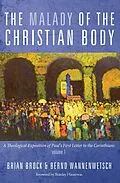The ailments of the contemporary church are remarkably similar to those suffered by the fractious Corinthian church in the first century. This is the challenge presented in The Malady of the Christian Body, a two-volume commentary by Brian Brock and Bernd Wannenwetsch. The manner in which Paul engages questions of factionalism, sexuality, legal conflict, idolatry, dress codes, and eating habits reveals that neither the malady he diagnoses nor the therapy he offers track the dominant accounts currently on offer of the malaise suffered by today's church. This volume depicts the Apostle as carefully examining the organic whole that is the body of Christ in order to detect obstacles to the healthy flow of powers that sustain its life. The therapy that is then offered comes by way of a redirection of the Corinthian believers' attention to the ways in which they can embrace God's active working among them to heal their broken unity. This book breaks new ground in crossing and reconfiguring the traditional disciplinary boundaries between biblical studies, systematic theology, and theological ethics.
Autorentext
Brian Brock is Reader in Moral and Practical Theology at the University of Aberdeen. He is the author of Singing the Ethos of God, Christian Ethics in a Technological Age, and most recently, Captive to Christ, Open to the World.
Bernd Wannenwetsch was Professor of Systematic Theology and Ethics at the University of Oxford, Chair in Theological Ethics at the University of Aberdeen and the president of the Society for the Study of Christian Ethics. His publications include Political Worship, Guter schneller Tod?, and Verlangen.
Interviewed by Amy Erickson
Amy Erickson: Both of you are systematic and moral theologians. How come you have turned to writing a biblical commentary, and how did it feel to be working outside of your usual habitat, so to speak?
Bernd Wannenwetsch:
It felt absolutely great. In fact, I don't remember I have ever had so much joy working on a project. In the end most of what made the process so satisfying came from constantly being pushed out of our normal academic comfort zone. There is a sense of intellectual adventure that comes with the challenge of having to find one's feet in unknown territory. The mental and practical preparation necessary for writing a commentary is very different than what is demanded by a monograph or scholarly article. What we found liberating about doing theology in a different literary genre is the way it pushed us not only out of the routine working patterns in our normal area but also made us take a step back from the tried and tested intellectual approaches we have found to work well enough to be repeated over and over again.
At the same time we were also surprised at the extent to which working directly on a biblical text felt like a homecoming. We really shouldn't have been surprised by this because, historically speaking, the attempt to try to understand Scripture for oneself and then help others to see what you have seen is the very impulse that gave birth to the intellectual praxis we call theology. There is no doubt that we had both been usefully prepared for this task in long having been convinced that Christian ethics, if it is going to be genuinely theological, has to be rooted in biblical inquiry. No matter how novel or "unprecedented" it may appear, every subject we think about in theology demands a fresh look at the biblical tradition in order to be understood more fully and truthfully. We discovered again that when we take ideas and dilemmas we feel to be novel to Scripture, what we discover anew that it is Scripture that is always new and fresh.
AE: What made you chose 1 Corinthians?
Bernd Wannenwetsch:
The suggestion initially came from a publisher, but the fact that the letter is so rich in discussions of concrete moral problems made the invitation immediately attractive. What we discovered not long after is that this was also a real temptation--to read Paul too instantaneously as a "fellow ethicist". We only discovered this as a temptation when it became clear that if we were really to get to grips with Paul's approach to the moral questions he discusses, we were going to have to dig deep into the doctrinal convictions and discourses that undergird his explicit moral exhortations and arguments. We often found that it was only when we resisted moralizing modes of interpreting Paul that a window swung open to a different, more exciting and ultimately more truthful understanding of what he has to say.
Brian Brock:
What was illuminating about this process is that through it we made the unexpected discovery that the letter is organized by an unexpectedly deep theological unity. Despite the fact that biblical scholars consider the letter to be largely free of textual emendation and genuinely Pauline, it is nevertheless in practice almost always read in a manner that firewalls the doctrinal and moral passages in the letter off from one another. We discovered that the letter really is not made up of separate discussions of ethical problems and worship practices that are set within some theological prefatory remarks. It is an integrated theological investigation of all these problematics at the same time. Attempting to understand Paul's moral exhortations, we were continually being drawn more deeply into his theological vision of the whole of creation and the salvation economy--which exposed the superficiality of the very common practice of dividing the book up into parts devoted to decorum in worship, sexual ethics, and a theology of love.
AE: Another unusual aspect of this book is that it is co-authored. How did you make this work for you?
Brian Brock:
We ended up...
